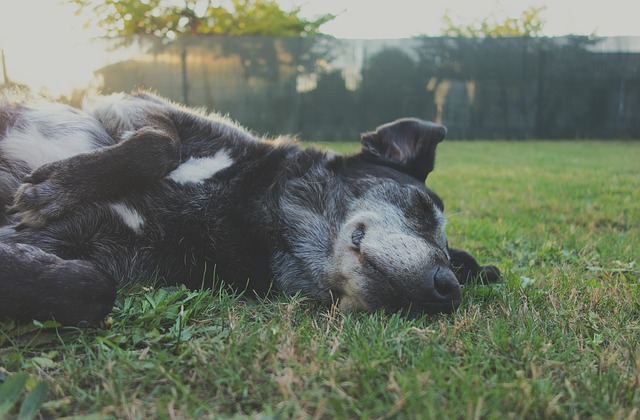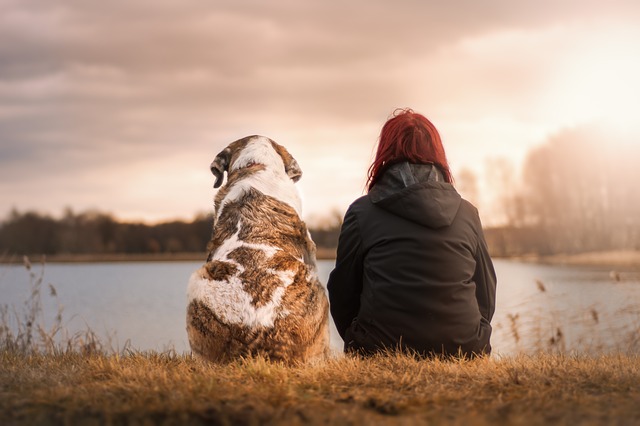If you’ve heard about using essential oils to support your pet’s health (especially while looking for natural methods) you probably have a lot of questions.
The topic of essential oils is particularly tricky because there’s so much conflicting information out there. Below, we’ve aimed to answer some of the most common questions that pet parents want to know about using essential oils with their dogs, specifically in the realm of aromatherapy – or the use of scent to enhance a feeling of well-being, relaxation, and calm. This information is by no means exhaustive, but it’s a great starting point!
The bottom line is that the safest way to make any health-related lifestyle changes with your pet is to consult with a vet, and in this case, a holistic vet may be the best way to go.

1. Is it safe to use essential oils with my pet?
The short answer is yes — but ONLY certain, high-quality essential oils and ONLY when done correctly.
Dr. Karen Becker, a widely known veterinarian in holistic pet care, has several articles and interviews online that feature Dr. Melissa Shelton, a holistic DVM and founder of AnimalEO, an essential oils line designed for animls. An expert in essential oil treatments for pets, Dr. Shelton described in an article on Healthy Pets how to safely use this natural remedy for your dog.
First, you must make sure that you’re using a top quality essential oil that’s safe for your pet (more on that below). The article explains that Dr. Shelton “can usually trace a problem with an essential oil back to it being a synthetic oil, a poor grade oil, or a situation of misuse by the consumer.”
2. But I’ve heard essential oils are bad for animals – why is that?
This is a tough one. Part of the reason could be, as mentioned above, adverse reactions were caused by synthetic or sub-par oils, or from misuse (like putting a harmful oil on a a pet). Of course, it is always possible that some animals may have allergies or sensitivities to certain oils. What’s more, it’s important to note that some oils are, in fact, very dangerous for our companions (more on that below).
It could be a combination of these reasons or others that have some vets and animal health websites steering their clients away from using this holistic remedy. This is also a reason why we at iHeartDogs suggest helping your dog with essential oils through aromatherapy, focusing on scent rather than directly applying an oil to their fur or skin, which is much more likely to cause a reaction or irritation. If you’d like to use essential oils topically on your dog, consult with a holistic vet.
3. How can essential oils help my dog?
Essential oils are versatile and can be used to treat a variety of physical and emotional issues across different species. But for the purpose of aromatherapy, certain scents can help promote calmness, happiness, restful sleep, focus, combat nausea and motion sickness, and more.

4. How do I choose a quality essential oil that is beneficial for my dog?
Essential oils are used for many different reasons, from arts and crafts projects to medicinal purposes. That’s why it’s hard to find a comprehensive list of the “best” oil brands out there — it really depends on what you use them for.
For the purpose of helping improve your dog’s health, you’re going to need essential oils that are 100% pure and of high quality. On their website, The Herbal Academy details what buyers should consider in a product, covering these bullet points:
- Label: Botanical name, plant part, country of origin, distillation date and/or expiration date, chemotype (if applicable), and “Keep Out of Reach of Children” statement
- Cost: If it’s too good to be true (much cheaper than other brands), it probably is.
- Testing: Especially GC/MS testing [this is a mark of quality, meaning that gas chromatography and mass spectrometry tests are performed on batches]
- Organic, unsprayed, or wildcrafted
- NAHA or other association memberships
- Sustainability and economic cooperatives or initiatives
For more information, read this article on choosing high-quality essential oils by The Herbal Academy. They also have a list of independent suppliers and links to their websites, including AnimalEO, Dr. Shelton’s brand.

4. Which oils are beneficial for dogs and why?
Once you’ve decided on an essential oil supplier, you’ll want to make sure that you choose the right product to help (and not hurt!) your dog! The fact is that some essential oils can have negative effects on your pup’s health, so it’s never wise to choose one just because you think it “smells good.”
Keep in mind that the same oil can’t always be used the same on different species of pets. For instance, cats are very sensitive to certain plants and botanicals, so one that’s safe for your dog may be toxic for your cat.
According to Dogs Naturally Magazine, Naturally Living Ideas, and Rover.com, these are just a few essential oils that can provide beneficial aromatherapy for dogs:
- Lavender: This floral scent is widely known for its calming properties, and can help ease stress including that related to separation anxiety and car rides. It can even help dogs (and people!) sleep better.
- Frankincense: This ancient remedy can boost immune system health, and has even been known to help fight cancer.
- Chamomile: Often made into a “sleepy-time” tea, this herb can calm dogs from the inside out. The scent alone may make your dog drowsy, and can be combined with lavender oil.
- Spearmint: Beneficial in digestion and stomach upset, this fragrance can help relieve your pup’s nausea or upset stomach. This could be a helpful natural remedy for nervous car riders.
- Lemongrass: Aside from its pleasant scent, lemongrass is a natural insect repellant. Wearing a scented bandana may help keep pests away from an outdoor-loving pooch.
- Citronella: Not to be confused with the chemical-filled candles, this essential oil can also help keep bugs away, and can be combined with lemongrass.
- Cardamom: Another remedy for nausea and stomach upset, cardamom can also help make your dog happier with its anti-anxiety properties.
- Cedarwood: Among its many uses, this essential oil can help timid dogs by easing anxiety-rooted aggression and can promoting a sense of security.
As always, do your own research and consult with a holistic vet before treating your dog with essential oils in any way. If you are not 100% sure that an essential oil is safe for your pet, it’s best to err on the side of caution and avoid it.

5. Which essential oils can harm my dog?
This list may be the reason that many pet health resources scrap the idea of using essential oils altogether. The wrong treatment can lead to effects including vomiting, muscle tremors, organ failure, and even death. (As mentioned above, owners of both dogs and cats should avoid using essential oils on their dog that could harm their cat.)
According to Essential Oil Haven, these are just a few of the oils that should not be used around dogs, topically, as aromatherapy, or otherwise:
- Tea Tree Oil
- Cinnamon
- Citrus (lemon, orange, tangerine)
- Ylang Ylang
- Wintergreen
- Sweet Birch
- Pennyroyal
- Pine
With that said, the right essential oil can be a powerful natural remedy to greatly improve your pup’s life!
6. Will my dog be sensitive to the smell?
Our dogs’ noses are up to tens of thousands of times more sensitive than ours, so it’s natural to be concerned about overwhelming them with scent. That’s why the instructions for our aromatherapy bandanas recommend that pet parents only apply ONE DROP of essential oil or essential oil blend onto the provided felt heart. In fact, you could even dilute the oil drop with water or other carrier oil as you introduce aromatherapy to your pup.
Think about all the other scents our dogs encounter around our houses: bleach, cleaning products, detergents, perfumes, deodorizing sprays, and air fresheners, which bombard their noses on a daily basis. With all this considered, the smell of an all-natural (and pup-safe!) essential oil, when used in small amounts, should be pleasant to your dog’s nose!
If your pooch seems agitated when wearing the bandana and you suspect it’s the smell, simply wash it and let her wear it without the infused heart — at the very least, she’ll still have an adorable accessory!

7. What is the best way to introduce essential oils into my dog’s healthcare routine?
First and foremost, the best way to begin adding essential oils into your dog’s healthcare routine is to consult with a holistic vet. Second, you must do your research – if you’ve read through this article, you’re definitely off to a good start!
Aromatherapy is a great way to introduce essential oils to your dog, and further, diluting these oils with a bit of water or carrier oil will also ensure that the scent isn’t too strong for your canine companion, especially as he is getting used to it.
Dogs Naturally Magazine also recommends using essential oils for short periods of time with breaks in between.

These statements have not been evaluated by the Food and Drug Administration. This product is not intended to diagnose, treat, cure, or prevent any disease. The information on this website is not intended to replace a one-on-one relationship with a qualified healthcare professional.

